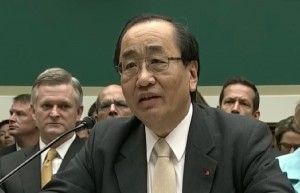
Takata's Hiroshi Shimizu is likely to face some hostile questions if he's called to testify before lawmakers next week in Washington D.C.
Takata’s recent acquiescence to federal regulators pushing the supplier to declare 33.8 million airbags defective likely won’t be enough to save the company’s executives from another appearance before U.S. lawmakers.
The hearing aims to provide officials with an update on how the problem with the airbags, which have caused largest single recall in U.S. history, is going to be resolved and when. It’s expected that officials from Takata, the National Highway Traffic Safety Administration and other Transportation officials will make appearances.
While who specifically will be called to testify before the Commerce, Manufacturing and Trade Subcommittee, which is part of the U.S. House Energy and Commerce Committee, isn’t yet known, when the hearing convenes in Washington D.C. on Tuesday it’s a safe bet, Takata officials will face some harsh questioning.
The committee chairman, U.S. Rep. Fred Upton, R-St. Joseph, described 2015 as “a year of Takata ruptures and recalls.” During the last session in December, Hiroshi Shimizu, senior vice president of global quality assurance at Takata, told the House Energy and Commerce subcommittee during the hearing that the available data and scientific evidence on the airbags “doesn’t support” a nationwide recall.
(NHTSA applies pressure to speed up Takata airbag recall. For more, Click Here.)
A more contrite response will likely come in light Takata’s agreement to the recall. However, when lawmakers press officials on how they plan to speed up the repair of the faulty airbags, there may not be an answer.
Some estimates suggest it will take five years to repair the affected vehicles. When the number was just half that, the expectation was two years and this was after Takata had doubled production and enlisted some of its competitors to build replacements.
(Click Here for details Takata issuing the largest recall in U.S. history.)
NHTSA just filed legal paperwork compelling Takata and the affected automakers to develop a plan to expedite the process. However, if Transportation Secretary Anthony Foxx doesn’t like the plan, he can reject it and implement one of his own.
The agency ultimately plans to oversee the recall process. It is part of the Transportation Recall Enhancement, Accountability, and Documentation Act, or TREAD Act, which became law in 2000 in the wake of the recall of Ford Explorer SUVs.
(To see more about Toyota’s vow to solve the Takata airbag problem, Click Here.)
The airbags overinflate and can explode, sending shrapnel into the vehicle’s cabin. The devices have been tied to six deaths and dozens of injuries. For months, Takata dragged its heels on issuing a recall on all the vehicles saying that the evidence implicating the inflators was unclear.
